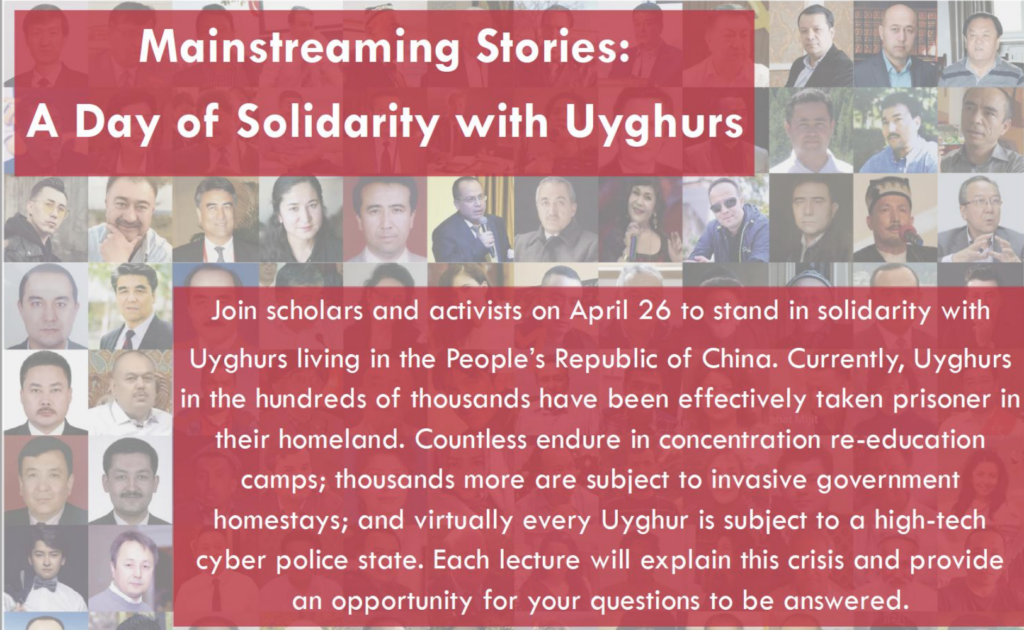Mainstreaming Stories: A Day of Solidarity with Uyghurs

April 24, 2019
Henryk Szadziewski, Senior Researcher, Uyghur Human Rights Project
The accounts of the ‘re-education’ regime that people are undergoing in those camps are harrowing…I imagine my lovely, principled, dedicated colleague there, and I feel incredibly angry.
Dr. Rachel Harris, University of London
The disappearance of Dr. Rahile Dawut, a leading expert on Uyghur folklore and traditions at Xinjiang University, into an internment camp around December 2017 shocked her academic peers outside of China as the above quote notes. Dr. Rahile worked and is friends with several overseas scholars focused on Uyghurs. In an essay for the Los Angeles Review of Books, Dr. Darren Byler wrote about the indispensable support Dr. Rahile offered to researchers from the United States and Europe. Rahile’s pioneering ethnographies and student-centered approach earned her the respect of the academic community in the Uyghur homeland and abroad. She collected stories and as Darren Byler wrote she showed “how Uyghurs can take control of their own stories by sharing knowledge of their land.”
It has been more than two years since we learned about the mass-internment of Uyghurs and other Turkic peoples in camps. Researchers have used Internet searches of government construction bids, analysis of satellite images, and interviews with Uyghurs and other Turkic peoples to uncover these secretive camps. One of these researchers, scholar Adrian Zenz, estimates the number of individuals in camps at a staggering 1.5 million.
The tight state restrictions imposed on research in the Uyghur homeland can create an information void on what is happening in the region. However, the painstaking work of these scholars offers credible evidence contradicting the Chinese government’s claim that the camps are merely ‘vocational training centers’ and presents an analytical understanding of current conditions undertaken from years of interactions with the land and people.
The response to Dr. Rahile’s disappearance and the determined exposure of human rights abuses on a vast scale is testament to a close connection between knowledge and relationships among scholars of the Uyghur experience. Given these commitments, at a time of emergency, academics are speaking out. The academy is sometimes criticized as slow to respond to crises, so when a large group of experts raises the alarm, we should listen to these voices.
For example, the November 26, 2018 ‘Statement by Concerned Scholars on China’s Mass Detention of Turkic Minorities’ includes 646 signatories from 40 countries and “calls on states and institutions to issue formal statements demanding that Xi Jinping and Chen Quanguo immediately abolish the ‘transformation through education’ detention system and release all Uyghur, Kazakh, Kyrgyz, and other detainees.” The ‘Xinjiang Initiative’ includes 278 academics willing “to raise awareness of the situation in Xinjiang at every public event in which they are a participant,” and 391 academics have signed the ‘Czech and Slovak Appeal for the Closure of Political Reeducation Camps for Uyghurs and Other Minorities and for the Observance of Internationally Acknowledged Human Rights in the People’s Republic of China.”
On April 26, scholars will take a further step and hold ‘Mainstreaming Stories: A Day of Solidarity with Uyghurs.’ Leading researchers on Uyghurs will hold a local talk in twelve locations about the ongoing emergency in the Uyghur homeland and the initiative includes presentations by:
- Timothy Grose (Rose-Hulman);
- Sandrine Catris (Augusta University)
- Magnus Fiskesjö (Cornell University)
- James Liebold (LaTrobe University)
- June Dreyer (University of Miami)
- Kristian Petersen (Old Dominion University)
- Vanessa Frangville (Université Libre de Bruxelles)
- Sophie Richardson (Human Rights Watch)
- Rian Thum (Loyola University, New Orleans)
- Rachel Harris (University of London)
- Mustafa Kérim (Indiana University)
- Hannah Theaker (University of Oxford)
- A guest speaker at the University of Denver
The series of events on three continents offers an opportunity to hear the work of these scholars, their experiences in the Uyghur region, and why the current mass-internment campaign should be a cause for global action.
A recent Uyghur Human Rights Project report documented the disappearance, internment, and imprisonment of nearly 400 Uyghur, Kazakh, and Kyrgyz intellectuals. As part of the research team working on the report, I asked Uyghur intellectuals in exile about the long-term consequences of the mass-internment campaign and the targeting of intellectuals. Artist Rahima Mahmut responded: “By destroying the scholars, artists, and intellectuals there will be a void, as there will be no one to represent the thoughts and direction that future generations require to build for the future, using their deep historical and cultural knowledge.” As Rahima notes, stories matter. They become collective memories and the foundation of learning. At present, Dr. Rahile Dawut cannot tell her stories; however, her colleagues are filling the silence.
